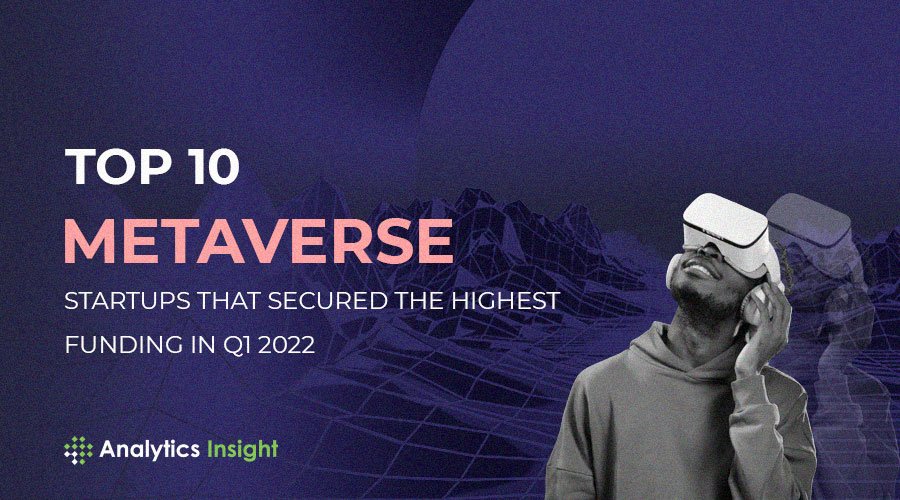by Satavisa Pati
April 24, 2022
These metaverse startups are going to achieve full potential in the first half of 2022.
According to experts, the global metaverse market reached $47.69 billion in 2020 and is estimated to register a revenue CAGR of 43.3 percent to $828.95 billion by 2028 during the forecast period. Here are the top 10 metaverse startups that have secured the highest funding in the first half of this year.
PlayersOnly
PlayersOnly is a US-based startup that offers a decentralized sports social media ecosystem. It leverages DeFi to create a marketplace that allows athletes and brands to collaborate to create digital collections and experiences. The startup also offers a social network that connects athletes. DeFi interactions on the marketplace and the social network are facilitated by PlayersOnly (PO) token. In addition to supporting athletes, the startup’s solutions enable fans to invest in their favorite players and teams.
Enjin
Founded in 2009, Enjin is a blockchain company specializing in NFT solutions. The startup has developed a full ecosystem of blockchain software products and solutions that enable developers, businesses, and individuals to create, manage, trade, distribute, and integrate Ethereum-based NFTs. Enjin is developing Efinity, a blockchain-based ecosystem built on Polkadot intended to serve as the infrastructure for a decentralized, cross-chain metaverse. Efinity is currently in the internal alpha stage.
NextMeet
Indian startup NextMeet develops an immersive virtual reality (VR) platform for remote working, collaboration, and distance learning. The platform features 3D avatars that let users interact with each other virtually over the metaverse. This makes situations like work from home (WFH) and online learning more interactive and engaging as compared to video calls. The startup also creates custom 3D worlds for virtual events such as conferences, trade fairs, and product launches.
The Sandbox
A subsidiary of Animoca Brands, The Sandbox is a leading decentralized gaming virtual world. The Ethereum-based platform lets players “play, create, own, and govern a virtual world.” Players can own in-game assets in the form of non-fungible tokens (NFTs), such as plots of land that they can build on.
Zepeto
Zepeto, a product of Naver Z, allows users to play games, communicate with others through 3D avatars, as well as make money through the production of fashion items and other content. Zepeto boasts 250 million accumulated users globally, 1.5 million creators, and 50 million items sold. The startup has previously collaborated with fashion brands including Gucci, Dior, Nike, and Ralph Lauren, which have released virtual collections on the metaverse. Popular K-pop groups such as Blackpink, ITZY, and SF9 have also held virtual events or issued exclusive content on the platform.
PolkaWar
PolkaWar is a Singaporean startup that builds an NFT gaming platform. The platform combines decentralized finance (DeFi) and immersive gaming. The startup’s game features a marketplace where players sell in-game items and weapons for crypto. Players earn PWAR, the startup’s crypto-token, by participating in the game, renting their in-game equipment, as well as staking their existing tokens.
Axie Infinity
Axie Infinity is a blockchain-based gaming metaverse developed by Sky Mavis, a startup headquartered in Singapore. The game is centered around collectible digital pets that can be bred, battled, and traded. These digital pets come in the form of NFTs. The metaverse includes play-to-earn opportunities, providing some users with regular income. The digital ecosystem attracts some 2 million users per day.
Zash
UK-based startup Zash leverages Web3.0 technologies to develop a social investing network for crypto investors. The startup’s social network is creator-led, allowing retail investors to create communities and learn from each other. It offers a set of tools that allows creators to create investing ideas and share them with followers. By leveraging and combining metaverse and the creator economy, the startup’s solution advances retail investing to attract new retail investors, particularly from the younger demographics.
GuildFi
GuildFi is a Thai startup that aims to develop a Web3 infrastructure to connect games, NFTs, and communities to maximize players’ benefits and enable interoperability across the metaverse. The platform has attracted more than 100,000 registered users and 25,000 daily active users. Last year, it closed a US$6 million seed round co-led by DeFiance Capital and Hashed. The round also included backing from the likes of Pantera Capital, Coinbase Ventures, and Dapper Labs.
Union
Spanish startup Union provides virtual identity solutions for the metaverse. The startup’s technology turns selfies into realistic 3D avatars for use in augmented (AR) and virtual reality games and experiences. These avatars are low-poly and rigged as well as transferable across social networks, both traditional and in the metaverse. For businesses building metaverse applications, the startup’s solution enables easy and low-cost creation of non-player characters (NPC). This improves user experiences as well as customer engagement in the metaverse.
Share This Article
Do the sharing thingy
Credit: Source link





















